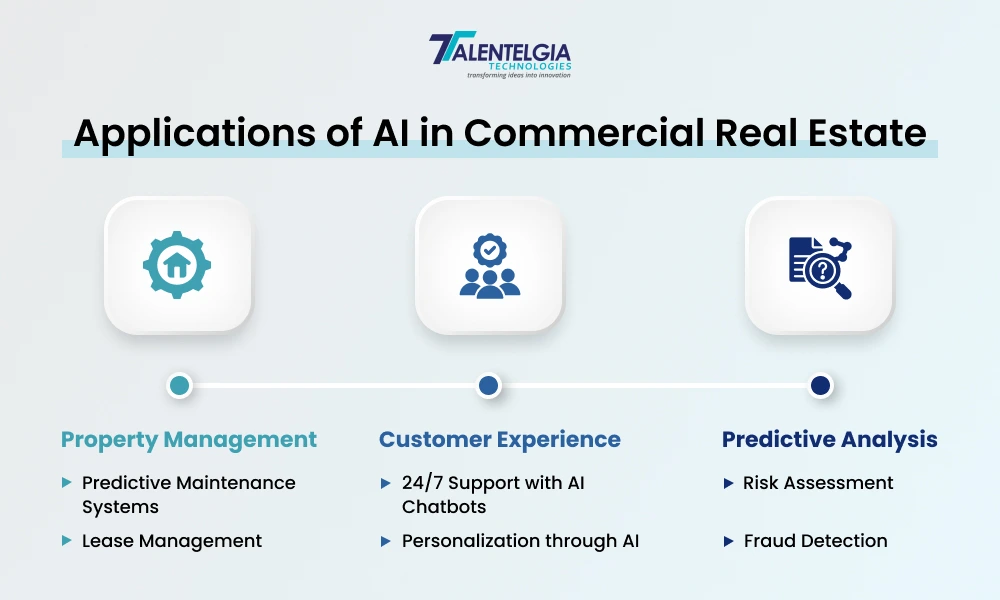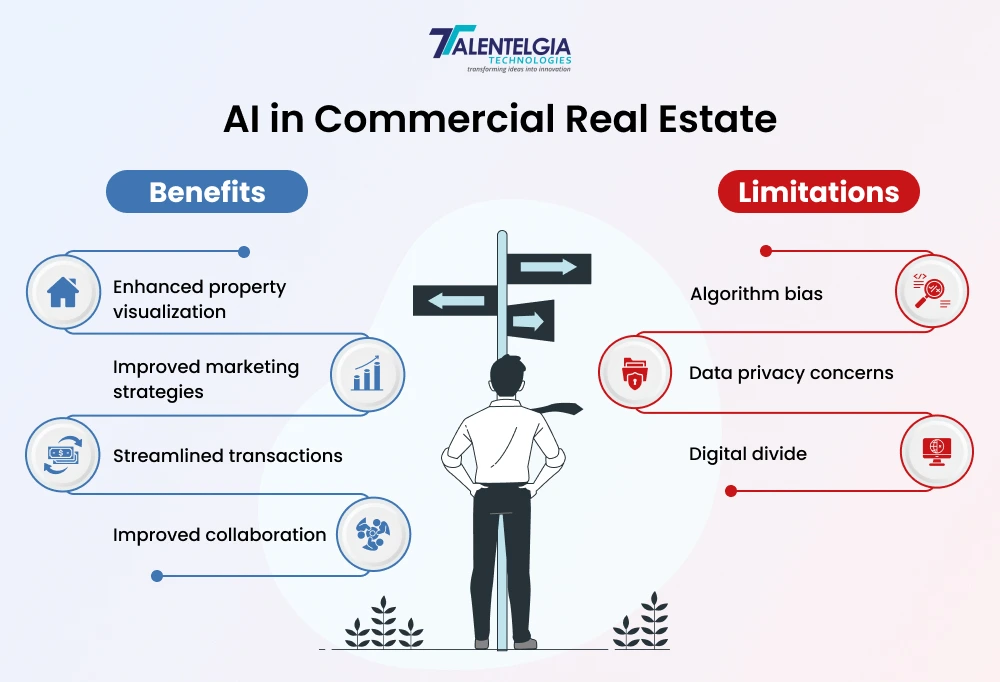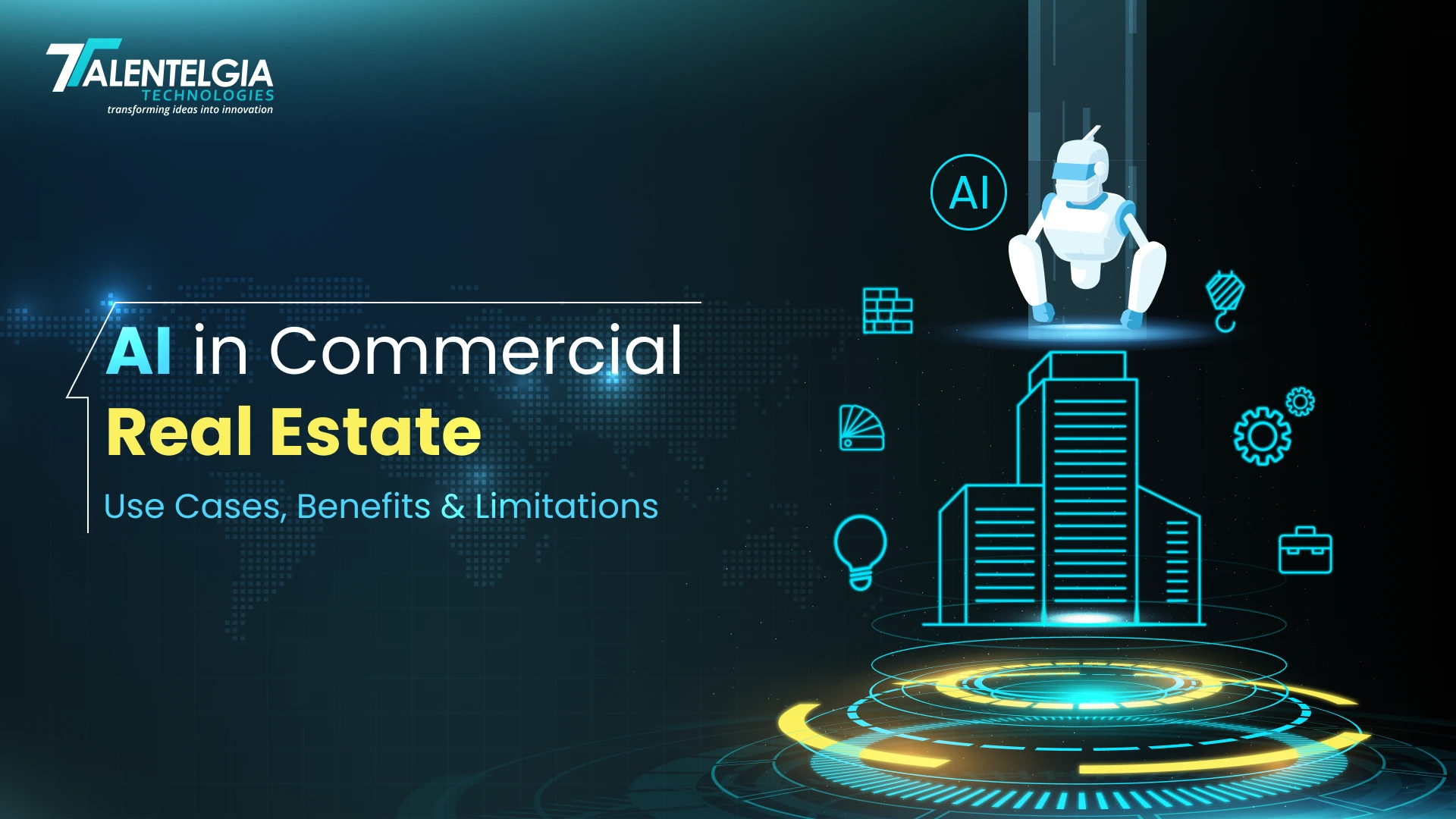AI in Commercial real estate is revolutionizing the way the industry operates. AI is now being integrated into real estate operations like property management, valuation, and client interactions. Even sub-components of AI such as generative AI are now popular amongst real estate players. For instance, according to McKinsey Global Institute, “gen AI could generate $110 billion to $180 billion or more in value for the real estate industry.” This has drastically changed the way real estate views its operation, enabling more precise forecasting, advanced property analytics, and better customer engagement.
In this blog, we’ll understand the applications of AI in commercial real estate, the benefits and limitations that can accompany these applications, and how to stay ahead of your competition.
Applications of AI in Commercial Real Estate

AI integration services in commercial real estate have introduced innovative solutions that enhance business operations at all levels. Let’s understand this better with the real-use application of AI in commercial estate.
Property Management
AI has introduced some smart efficient solutions to make the entire process of property management seamless and efficient. Here are some key advancements:
Predictive maintenance systems: These AI-driven systems use data analytics, machine learning services, and IoT to check the efficiency of building systems and equipment. Predictive maintenance systems continuously monitor indicators like vibration, temperature, and energy consumption and predict any potential failures that might happen. This can eventually help property managers to schedule regular maintenance rather than depending on fixed schedules.
For instance, let’s say a commercial property has employed predictive maintenance of its HVAC systems. Sensors installed within the HVAC units will be able to monitor metrics like energy consumption. If any issue is detected in the system, prior alerts will be issued to take preventive action.
Lease Management: With the help of AI like Yardi and MRI Software, you can easily take care of regular tasks like lease management, rent collection, and others.
For instance, by analyzing lease data and current market trends, AI can easily generate lease agreements tailored to specific properties and tenants. Moreover, you can also streamline the rent collection process by automating repetitive tasks like payment reminders, payment tracking, and others.
Customer Experience
Providing a decent customer experience has always been at the forefront of the real estate industry. Here are a few use cases of AI in customer experience:
- 24/7 Support: Using AI Chatbot has proven to be a major advantage for the commercial real estate sector. From resolving queries related to property pricing, location, and project completion, these chatbots resolve almost every query instantaneously. Moreover, they are capable of handling multiple queries at one time, making the process seamless. This allows real estate professionals to focus on high-priority tasks like closing deals which can lead to higher revenue generation.
- Personalization: AI chatbots are capable of handling vast amounts of data, such as budget constraints, and location preferences. This approach takes into account unique client requirements allowing chatbots to give highly personalised advice. Moreover, a data-driven response increases client confidence in the process thereby making the property an attractive option.
Predictive Analysis
When it comes to commercial real estate, the financial stakes involved are usually high. This makes it important to have enhanced security measures and deeper insights backed by relevant data. Here’s how AI in commercial real estate can provide a detailed predictive analysis to decide on the best deals:
- Risk Assessment: AI tools have become essential when it comes to evaluating various risk factors including a tenant’s creditworthiness, property valuation, and market trends. AI tools like Zillow’s Zestimate make use of a property’s past income generation to evaluate its prospects. Other tools like ClearNow make use of a tenant’s rental history to evaluate the creditworthiness. By doing this, property managers can avoid high-risk tenants and analyze the maximum income that they can generate on their property.
- Fraud Detection: AI algorithms can play a significant role in safeguarding transactional data for fraud detection, such as irregular payments, insufficient tenant details, or others. This proves to be helpful when a large amount of data is to be analyzed and human capabilities are limited. Moreover, these algorithms can adapt and learn new patterns. These help them identify any new fraud patterns thereby improving brand image and market appeal.
Benefits of AI in Commercial Real Estate

AI in commercial real estate has made the process more efficient and user-friendly. This is mainly because of the fast processing speed and data-driven insights provided by AI tools which makes them more reliable. This also enhances user trust in the models and helps improve brand image in the long run. Let’s understand more about the benefits of AI in commercial real estate with the help of a few use cases:
- Improved Visualisation: Integrating AI with technologies like Augmented Reality and Virtual Reality has changed the way consumers evaluate properties. Features like virtual tours allow clients to view properties in depth without having to physically commute to the location. This saves both time and cost. Moreover, even property managers can focus on only those clients who have already finalized the property by putting the other tasks on AI.
- Marketing strategies: AI can play a vital role in improving your brand image and taking it to a larger audience effectively. Tools like HubSpot use algorithms to differentiate audiences into specific groups and create tailored marketing campaigns. Moreover, AI prioritizes leads based on the likelihood of their conversion thereby increasing the chances of revenue generation.
- Seamless Transactions: AI in commercial real estate improves the transaction process by automating tasks like compliance management, document processing, and payment verification. This not only saves time and energy but also reduces human dependency and errors that might happen in the process. The result? better client management and enhanced operational efficiency.
- Improved Collaboration: When it comes to collaboration, AI has significantly improved the manner of day-to-day communication between teams and all the stakeholders involved. Tools like Slack, which are integrated with AI capabilities, help improve organizational efficiency and client interaction. Features like real-time information sharing and automated meeting schedules make the entire process of property valuation and dealing efficient and smooth, thereby enhancing operational efficiency.
Limitations of AI in Commercial Real Estate
While AI in Commercial real estate has transformed the sector for the better in a variety of ways, it does have its own set of limitations. Let’s uncover some of them to help understand the other side of the coin:
- Algorithm Bias: A major limitation of AI in commercial real estate is its ability to have biased algorithms, which can ultimately lead to unfair decision-making. It has been seen that AI models are usually trained based on historical data. If the same data has some biases, the current model automatically gets infused with these biases.
- For instance, if a particular AI model has been trained to have discriminatory lending patterns, it might target only a certain community as potential customers. Moreover, it can also ignore certain localities, making it hard for the residents to secure loans or sell their properties at fair value.
- A relevant example of this case is Zillow’s Zestimate Tool. This tool faced criticism for showing inaccurate property valuations in black or Hispanic-majority communities. This asserts the importance of using large data sets to ensure fair outcomes for all and checking the impact of the current data on the long-term brand image.
- Data Privacy and Ethical Concerns: The emergence of technologies like deepfake has raised ethical concerns like virtual property staging, where misleading images can disorient a client’s decision-making process. For instance, the use of AI to create highly realistic images of a property can mislead potential buyers about its actual outlook. This can, in the long run, lead to legal recursions based on misrepresentation. It is therefore important to keep a continual check on the kind of functions that AI is being utilized for in commercial real estate.
- Digital Divide: The increasing use of AI in commercial real estate can lead to a potential digital divide between the big players and the smaller ones. Having access to the resources and required technologies can open new opportunities for the big corporations while at the same time, it can also restrict the ability of small firms to expand and reach the larger audience.
Future of AI in Commercial Real Estate
AI is not a temporary phenomenon in commercial real estate. It has the potential to change the way properties are managed and customer relationships are maintained. Moreover, with the rising integration of AI in almost all sectors, commercial real estate will also have to adapt to the changing environment.
According to a Deloitte Survey, “over 72% of real estate owners and investors plan to commit to AI-enabled solutions within their organizations.” This highlights the importance of AI in how commercial real estate functions. Technologies like machine learning, predictive maintenance, and natural language processing are expected to transform how even regular operations are conducted in the commercial real estate sector.
Moreover, when we talk about the consumer side of the process, AI-driven investment decisions are expected to become the norm. Our real estate chatbot, Realty Pulse Pro is also an amazing choice if you want to go ahead with something innovative and new age.
All in all, the future of AI in commercial real estate is immense and while the pace of adoption has been slower in real estate when it comes to other sectors, a deeper integration will be seen in the upcoming future.


 Healthcare App Development Services
Healthcare App Development Services
 Real Estate Web Development Services
Real Estate Web Development Services
 E-Commerce App Development Services
E-Commerce App Development Services E-Commerce Web Development Services
E-Commerce Web Development Services Blockchain E-commerce Development Company
Blockchain E-commerce Development Company
 Fintech App Development Services
Fintech App Development Services Fintech Web Development
Fintech Web Development Blockchain Fintech Development Company
Blockchain Fintech Development Company
 E-Learning App Development Services
E-Learning App Development Services
 Restaurant App Development Company
Restaurant App Development Company
 Mobile Game Development Company
Mobile Game Development Company
 Travel App Development Company
Travel App Development Company
 Automotive Web Design
Automotive Web Design
 AI Traffic Management System
AI Traffic Management System
 AI Inventory Management Software
AI Inventory Management Software
 AI Software Development
AI Software Development  AI Development Company
AI Development Company  AI App Development Services
AI App Development Services  ChatGPT integration services
ChatGPT integration services  AI Integration Services
AI Integration Services  Generative AI Development Services
Generative AI Development Services  Natural Language Processing Company
Natural Language Processing Company Machine Learning Development
Machine Learning Development  Machine learning consulting services
Machine learning consulting services  Blockchain Development
Blockchain Development  Blockchain Software Development
Blockchain Software Development  Smart Contract Development Company
Smart Contract Development Company  NFT Marketplace Development Services
NFT Marketplace Development Services  Asset Tokenization Company
Asset Tokenization Company DeFi Wallet Development Company
DeFi Wallet Development Company Mobile App Development
Mobile App Development  IOS App Development
IOS App Development  Android App Development
Android App Development  Cross-Platform App Development
Cross-Platform App Development  Augmented Reality (AR) App Development
Augmented Reality (AR) App Development  Virtual Reality (VR) App Development
Virtual Reality (VR) App Development  Web App Development
Web App Development  SaaS App Development
SaaS App Development Flutter
Flutter  React Native
React Native  Swift (IOS)
Swift (IOS)  Kotlin (Android)
Kotlin (Android)  Mean Stack Development
Mean Stack Development  AngularJS Development
AngularJS Development  MongoDB Development
MongoDB Development  Nodejs Development
Nodejs Development  Database Development
Database Development Ruby on Rails Development
Ruby on Rails Development Expressjs Development
Expressjs Development  Full Stack Development
Full Stack Development  Web Development Services
Web Development Services  Laravel Development
Laravel Development  LAMP Development
LAMP Development  Custom PHP Development
Custom PHP Development  .Net Development
.Net Development  User Experience Design Services
User Experience Design Services  User Interface Design Services
User Interface Design Services  Automated Testing
Automated Testing  Manual Testing
Manual Testing  Digital Marketing Services
Digital Marketing Services 
 Ride-Sharing And Taxi Services
Ride-Sharing And Taxi Services Food Delivery Services
Food Delivery Services Grocery Delivery Services
Grocery Delivery Services Transportation And Logistics
Transportation And Logistics Car Wash App
Car Wash App Home Services App
Home Services App ERP Development Services
ERP Development Services CMS Development Services
CMS Development Services LMS Development
LMS Development CRM Development
CRM Development DevOps Development Services
DevOps Development Services AI Business Solutions
AI Business Solutions AI Cloud Solutions
AI Cloud Solutions AI Chatbot Development
AI Chatbot Development API Development
API Development Blockchain Product Development
Blockchain Product Development Cryptocurrency Wallet Development
Cryptocurrency Wallet Development About Talentelgia
About Talentelgia  Our Team
Our Team  Our Culture
Our Culture 
 Healthcare App Development Services
Healthcare App Development Services Real Estate Web Development Services
Real Estate Web Development Services E-Commerce App Development Services
E-Commerce App Development Services E-Commerce Web Development Services
E-Commerce Web Development Services Blockchain E-commerce
Development Company
Blockchain E-commerce
Development Company Fintech App Development Services
Fintech App Development Services Finance Web Development
Finance Web Development Blockchain Fintech
Development Company
Blockchain Fintech
Development Company E-Learning App Development Services
E-Learning App Development Services Restaurant App Development Company
Restaurant App Development Company Mobile Game Development Company
Mobile Game Development Company Travel App Development Company
Travel App Development Company Automotive Web Design
Automotive Web Design AI Traffic Management System
AI Traffic Management System AI Inventory Management Software
AI Inventory Management Software AI Software Development
AI Software Development AI Development Company
AI Development Company ChatGPT integration services
ChatGPT integration services AI Integration Services
AI Integration Services Machine Learning Development
Machine Learning Development Machine learning consulting services
Machine learning consulting services Blockchain Development
Blockchain Development Blockchain Software Development
Blockchain Software Development Smart contract development company
Smart contract development company NFT marketplace development services
NFT marketplace development services IOS App Development
IOS App Development Android App Development
Android App Development Cross-Platform App Development
Cross-Platform App Development Augmented Reality (AR) App
Development
Augmented Reality (AR) App
Development Virtual Reality (VR) App Development
Virtual Reality (VR) App Development Web App Development
Web App Development Flutter
Flutter React
Native
React
Native Swift
(IOS)
Swift
(IOS) Kotlin (Android)
Kotlin (Android) MEAN Stack Development
MEAN Stack Development AngularJS Development
AngularJS Development MongoDB Development
MongoDB Development Nodejs Development
Nodejs Development Database development services
Database development services Ruby on Rails Development services
Ruby on Rails Development services Expressjs Development
Expressjs Development Full Stack Development
Full Stack Development Web Development Services
Web Development Services Laravel Development
Laravel Development LAMP
Development
LAMP
Development Custom PHP Development
Custom PHP Development User Experience Design Services
User Experience Design Services User Interface Design Services
User Interface Design Services Automated Testing
Automated Testing Manual
Testing
Manual
Testing About Talentelgia
About Talentelgia Our Team
Our Team Our Culture
Our Culture

















 Write us on:
Write us on:  Business queries:
Business queries:  HR:
HR: 




